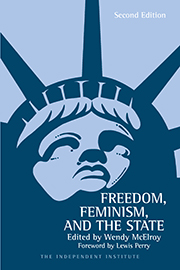The ongoing melodrama surrounding feminist author Naomi Wolf clearly shows that a cultural tide has turned. Wolf tried to fall back on Old Reliable—a tearful confession of feminist victimhood—and encountered skepticism instead of automatic sympathy.
On Feb. 23, in the cover story of New York Magazine, Wolf detailed a 20-year-old advance that an Yale professor allegedly made during her student days. She accused Harold Bloom, a renowned Shakespearean scholar, of putting his “heavy, boneless hand” on her thigh after a candlelight dinner party at her home, complete with wine and poetry. In reaction, she vomited. Bloom reportedly “moved toward” her—whether in pursuit or to assist is uncertain—then, he left.
The rebuff apparently had no major academic consequences for Wolf, who went on to win a Rhodes Scholarship.
Wolf’s contemporaries have savaged her story as a narcissistic attention-grab. Cristina Odone, deputy editor of The New Statesman, captures the tone of Wolf’s critics: “[W]e have had Naomi the victim of her youthful good looks (The Beauty Myth), Naomi the victim of her sexual allure (Promiscuities), Naomi the victim of motherhood (Misconceptions) ... The whingeing oeuvre has brought her international celebrity and not a few dollars.” [Titles refer to Wolf’s books]
The New Statesman article is particularly interesting because the magazine published a similar first-person confession in 2000. In its pages, Andrea Dworkin described being drugged and raped in a French hotel. That widely-reprinted story went virtually uncriticized by mainstream media, until Catherine Bennett offered a rare voice of cautious skepticism writing in The Guardian in the U.K.
Bennett asked why Dworkin—allegedly wounded during the rape—did not notify a doctor, the police, nor hotel security. The reluctance of a rape victim to be further violated might explain this, but Bennett found that explanation to be inconsistent with Dworkin’s “decision to relive the ordeal, in vivid detail, for readers.”
By contrast, Wolf’s story has not been so readily accepted. Commentators have almost demanded to know why Wolf did not complain to Yale about Bloom’s purported transgression, unconvinced by Wolf’s claims that she was persuaded not to do so by female faculty advisors. Wolf claims that Yale has never established a sound sexual harassment reporting procedure, and that she has come forward now to compel them to do so. But her critics have hooted in derision at the confession, which they say resembles a PR event, complete with a press release announcing the article’s imminent appearance.
My point is not that The New Statesman is hypocritical in its treatment of Wolf as opposed to Dworkin; my point is that our cultural assumptions have shifted. The claim of victimhood is no longer enough to make listeners suspend their critical faculties, even when made by a noted feminist. The New Statesman is simply reflecting that change.
The shift does not go far enough.
It is not enough to demand evidence and answers from accusers. It is necessary to extend justice to those who are and have been wrongfully accused.
Bloom may or may not be a lecher. Whatever the truth, however, he has a great advantage over most men within academia who are similarly accused. His teaching career is coming to a close. On campuses across North America, the merest whiff of an abuse accusation still ruins careers.
Daphne Patai is one of the few feminists to demonstrate compassion for such wrongfully accused men. In her book “Heterophobia,” Patai describes the savagery of sexual misconduct policies by which the accused has no due process or presumption of innocence but must prove his non-guilt to committees with the power to ruin his life.
One of the examples Patai cites is of an over-weight professor who was both well-liked and competent. One day, in the middle of a lecture, a female student called out a comment about the extreme size of his chest. He observed that she had no similar problem and, then, continued lecturing.
The student filed sexual harassment charges against him, based solely on the classroom incident. The ensuing witch-hunt was so extreme that the professor committed suicide. Thereafter, the university administration released a statement expressing its main concern: the professor’s death should not discourage other similarly “abused” women from “speaking out.”
Patai also highlights Professor Ramdas Lamb, a professor of religion at the University of Hawaii. As part of a course on contemporary social issues, Lamb assigned an article from a textbook that dealt with rape. A discussion ensued in class among the students about false rape allegations.
During the back-and-forth, several female students insisted that “women never lie” and became distressed when Lamb encouraged a hearing for all sides. A complaint was filed against him. A three-and-a-half year nightmare followed with an accusation of rape being raised. The accusation was proven untrue when some of the dates cited did not mesh with Lamb’s whereabouts.
Lamb later stated, “I used to love to teach. Not any more. I used to love to interact with students ... Not any more. I used to believe that university campuses promoted free speech and the truth. Not any more. I used to believe students when they would tell me things. Not any more.”
Scant years ago, Wolf’s theatrical confession would have been granted just such automatic belief. Even those with doubts would not have dared to raise them. The silence is over. It is now time to start talking about the ignored victims, about the wrongfully accused men. It is not enough to dismiss false accusers; restitution should be provided to those they have harmed.
What form of restitution? The possibilities range from an official apology to reinstatement and libel charges against the false accuser. Only then will the witch hunts stop.









